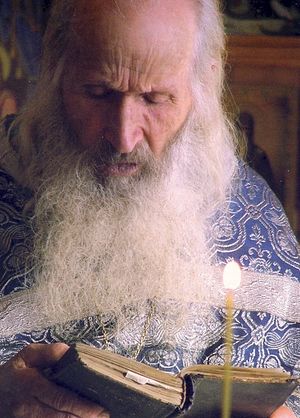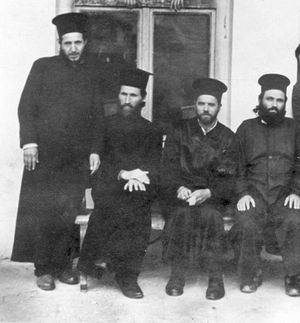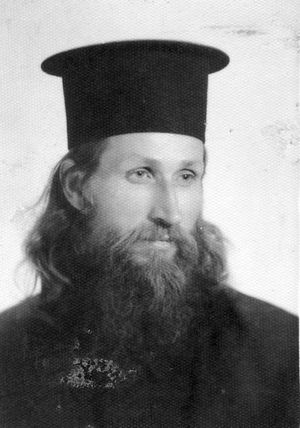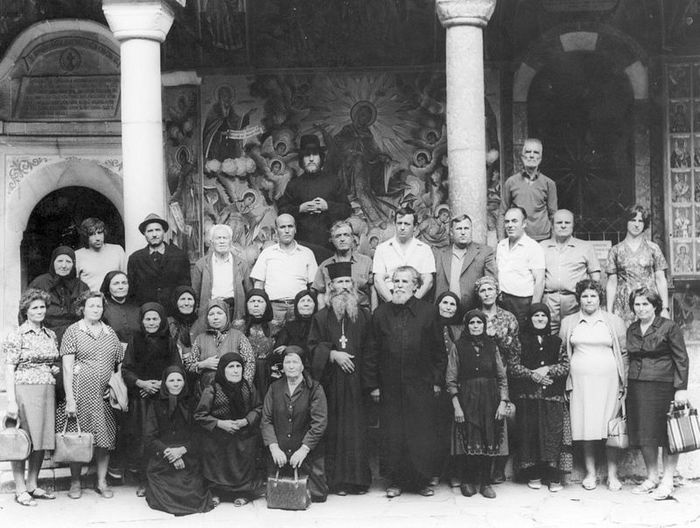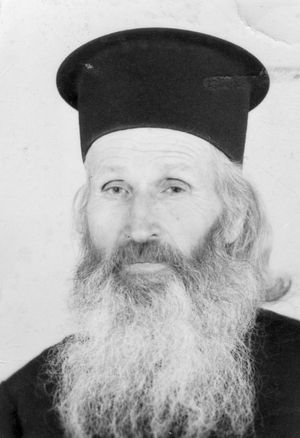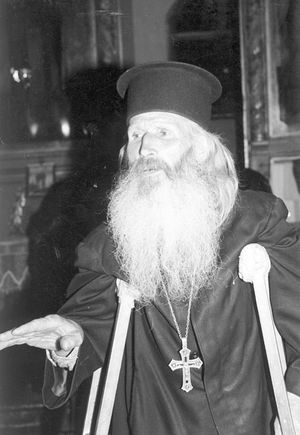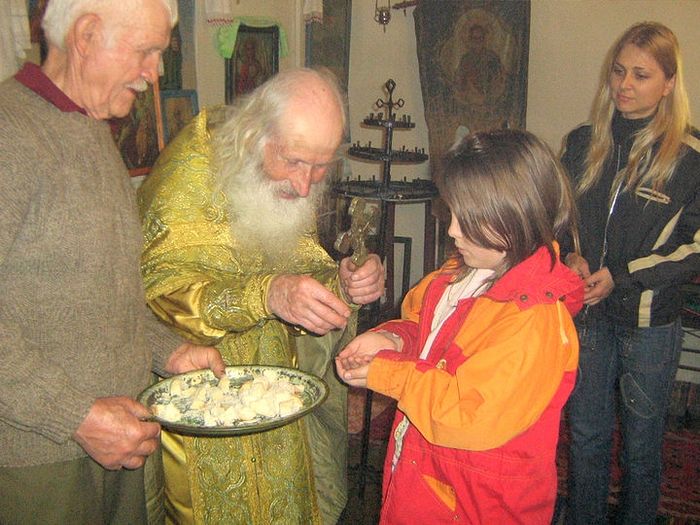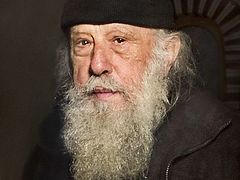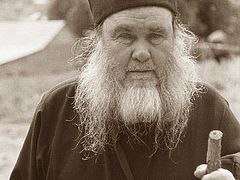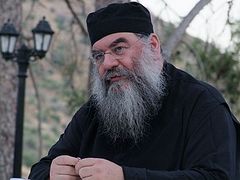Fr. George (also Georgy) Peichev from the Bulgarian village of Zheglartsi lived a long life (he reposed in 2015 at the age of ninety-two) and had numerous spiritual children – parishioners of churches in many towns and villages of Bulgaria. He is remembered at Liturgies and memorial services of Varna and Ruse, in the village of Orlyak and in Sofia, in the town of Dobrich and even in Moscow. His spiritual children pray to the elder privately and ask for his intercessions. They address their prayers to him believing that they will be answered. Their faith is not a “home canonization of a beloved pastor”, but is testimony to the unity of the Church on earth and the Church in heaven and their conviction that all are alive to God.
Many who converted to the faith at the age of reason remember their convert phase, when their souls were filled with the desire to share their discovery of this new world, of another reality with everybody else and talk about their faith nonstop. But if today talking about Christ is unlikely to cause troubles and sorrows, just about thirty years ago it was not safe to talk about religion in public. The period when many of us were building “a bright future” was in fact a very dark era for sincere believers. Not only in Soviet Russia, but also in socialist Bulgaria thousands and thousands of clergy and laity had to pay a high price for these talks: They were executed or languished in prisons for decades. The persecutions forced some priests in Bulgaria to renounce their priesthood, and one such example impelled an ordinary miner (the future elder) to turn to God and entreat Him to bless him for priestly ministry. The Lord heard George Peichev’s prayer and appointed him to serve in the altar.
Like Mikhail Lomonosov1 in Russia long before him, Fr. George at the age of forty sat down at the desk next to schoolboys. After a three-year course at a seminary he was ordained a priest. He inspired others by his example and prepared young people for seminary study. Thanks to his example, twenty other inhabitants of Zheglartsi and a neighboring village completed a seminary course.
Besides this miraculous transformation from a miner to a priest Fr. George experienced many other miracles in his life: his own revival after a clinical death and his son’s return to life after death. He had the marvelous ability to explain spiritual things in simple words, and in the environment of state atheism he managed to preach the word of God continually. His ardent faith and zealous preaching, which like fire kindled the hearts of many, annoyed the authorities most of all. The Committee of the Communist Party of Bulgaria, the then supreme body of the state power, twice tried to decide the elder’s fate; but by a miracle Fr. George escaped their punishment and lived a long life, serving God and people until a very advanced age.
“There are no coincidences in the work of God”
From early childhood George was obedient and zealous in spiritual life. And God protected the child.
Since the village lay by the edge of a forest, its residents would sleep outside in summer and there were cases of wolf attacks. One night a wolf penetrated the fence of the Peichevs’ house in order to steal a sheep. Little George was sleeping in a small washing tub that his mother used as a cradle. While everybody was sound asleep, the boy’s father Stojan woke up and saw a wolf bending over the baby. He yelled loudly, and the animal ran away, baring its teeth. George’s mother woke up too.
After that the family was more vigilant and kept watch over the cradle every night. One night Stojan came up to the cradle but did not find the baby in it. He woke his wife up and they searched for the child together. As it turned out, the boy had crept out of the cradle, crawled as far as the barn and fallen asleep there.
From his childhood the future elder would meditate on difficult subjects and ask himself such serious questions that not many adults can answer. When at the age of six George was once walking along a street he saw his shadow and started thinking about the nature of man. “What is my shadow and am I in it?” he asked his parents when he came back home.
In each family the mother and older sisters took the upbringing of each child upon themselves. The Peichev family was no exception. While the father was their breadwinner, the mother educated George in faith in the simplicity of her heart and told him about Divine providence for every human being.
As George grew up he asked even more such questions, and the Lord responded to his thoughts and helped him get to know Him. With his mind enlightened by faith, George did very well at school and became its best student.
With time he came to realize that all that he had experienced in his childhood and youth was preparation for his ministry. God kept him and instructed him step by step.
Fr. George would often refer to these reminiscences during his conversations with people for their edification and would conclude them with the following words: “The Almighty never jokes. There are no coincidences in the work of God!”
From his early years George used to labor under his elders’ direction and he always carried out the work he was charged with most diligently. This cultivated the most valuable traits of his character. When the boy was ten he was sent to help a man who looked after horses. George grew very fond of horses and took care of them. But one day an incident happened: when he was riding a mare it suddenly stumbled, he fell off, and the mare pressed his spine to the ground. With much difficulty George rose to his feet but couldn’t walk on his own as one of his legs became stiff. Only towards the evening did he get better, limp back home and tell his family about the incident. There was no doctor in the village, so they had no choice but to wait for the leg to heal on its own.
But George begged his sisters to carry him to the vineyard in a wheelbarrow. Nearby there was a stream that formed a small lake which warmed up in the sun. George stepped into the warm water without noticing that a leech stuck to his sore leg. When he went up out of the water he to his amazement saw a “puffed-up” leech attached to his leg! At the same moment he felt that the numbness and pain in his leg disappeared.
Since George liked musing on all that ever happened to him, he drew a conclusion: It was the Lord Himself Who had prompted him to bathe in the warm waters of the lake. The Creator Himself was his Doctor!
A vision
Many people who have gone through “clinical death” have claimed to have had some sort of “out of body experiences”. Fr. George used to tell people a similar story that happened to him. It was evidence of a God-loving soul about the things people feel in their last hours, about Paradise, Divine providence towards every human being. This is what he used to say: “Whatever counterarguments atheists may present or whatever words they may use to make me change my mind, I will never stop witnessing to what I saw with my own spiritual eyes. Nor will I cease to glorify the Lord and marvel at His miracles, as the Psalmist declares.”
Once on Monday of the first week of Lent George caught a bad cold, and by Thursday he had had high fever. He could neither eat nor drink. His older sister Gina looked after him. According to her account, this is what he said while sitting on his bed on Friday:
“Sister, I can see an ugly Arab standing in the room. I also saw him several years ago.”
“Where is he? I can see nobody!”
“He approached me and wanted to pierce me with his saber. I rose from my bed and ran out of the house. I came up to the bench in front of our house on which Koljo, Ivan and our father were sitting. I sat down next to them. As I was sitting there I saw a Divine hand appear from the icon corner of our room which touched my shoulder and then vanished. All this seemed very strange. Next I saw arrows fly directly towards me…”
Let us continue our story with the words of Fr. George: “I saw my dad bend over my chest, listen to my heart and tell my mother, ‘He is now breathless.’ As soon as he uttered this, a vast space opened up before me. I beheld an unearthly beauty and flowers emitting wonderful scent. On earth it was Lent at that time, so there was no vegetation in the streets. But that was only on earth.
I lay down on the flowers and felt an inexpressible bliss. I felt my sister was somewhere near me. I said to her, ‘It is good on earth, but this place is the most beautiful in the world!’ And she replied, ‘George, don’t leave us!’
“I saw deceased people there and they were bearing the offerings that were made for their repose on earth. And the Lord vouchsafed to show me the future, too. All the people that I saw there were dressed in modern clothes, not those worn back then in Romania2. After that I saw Christ on the cross and thought, ‘Lord, why are You on the cross? Are You still suffering for us?’
All that was revealed to me was a testimony to the fact that Jesus Christ is the living God. He remains with us in the Paschal light and in all times.
“Next I fell into a deep sleep. My nearest and dearest put a candle into my hands, lit it and also lit a censer-holder as if I were dead. As soon as I opened my eyes they removed the candle. The first words that I uttered on regaining my consciousness were: ‘Do you have anything to eat?’
“This was a little miracle that happened to me… Besides, I had seen ivy [while clinically dead] in the room where I lay during my illness. It grew exactly where we were to make an iconostasis of the church into which we were to convert our old house. I snapped off a small branch and gave it to my sister. At the same moment the whole room was illuminated and I said to my mom, ‘Keep this room! It will become a holy place!’ Thereupon I beheld an unearthly beauty and heard a chorus of angels singing.
This was in 1943. And twenty years later, in 1963, we converted this room into a church. Many priests from our village were to grow spiritually there.”
“Faith in God is a great power”
Feeling that the Lord was calling him to the priesthood, George did not want to marry. But he couldn’t even dream of monastic life in that extremely isolated region, and his sisters persuaded him to marry. Obeying his older sisters, George got married at the age of twenty-six.
At that time village residents did not marry before the age of twenty. His wife Maria hailed from Caramanchioi (the official name: Sălcioara, meaning “little willow”) and her parents settled in Isperikhsko in Bulgaria. Both were very pious. The Savior sent George a helpmeet who never hindered his spiritual growth. It was the Divine providence for both of them that they remain “in the thick of things”, helping people keep their faith and live piously by setting them an example to follow.
The young family began to live independently. They purchased a plot of land for the construction of their home and started building a house on their own. They made bricks with their own hands and thus gradually built the house.
As Fr. George related: “I built the house myself. All of my energy was spent on it, yet I never forgot that the main thing in life is the faith in God. It is a great power. It strengthens us.”
George would lay bricks, while Maria would smooth the walls with a mix of clay and manure. At last the walls were completed. They still had neither windows, nor doors, nor roof, but an oil lamp was already burning before a holy icon on the east wall. They decided not to lay the roof until the warm days of summer, and wait for the sun to dry the brickwork.
But scarcely had George begun working on the roof when a new obstacle emerged. The Communists forced all the peasants that refused to join agricultural co-ops—that is, labor agricultural cooperative farms [the equivalent of the Soviet collective farms] to do compulsory labor service with extremely high productivity demands, far exceeding those on the agricultural co-ops, thus coercing them into joining these co-ops anyway. A foreman came to George and said to him:
“Hey, man! Doesn’t labor service apply to you?”
“It does, I am obliged to cut fifteen cubic meters of stone. But I must build my house during the day, so I will do the cutting at night.”
And this is precisely what he did. The foreman’s van was not far from the stone quarry, so he heard George working. In the dark of the night he got out of the van and shouted:
“Who are you? What are you doing here?”
“You came to me earlier today and I promised you I would work at night.”
The man made a record in the list that George had done his work.
“Go home! I see you are a honest man.”
“Christ has armed you, so don’t be afraid of anything!”
Loudspeakers were installed in the village streets, secular music was transmitted and announcers constantly informed the residents about the “latest accomplishments of the Communists”. More and more people drifted away from the faith of Christ either consciously or out of fear. But not George Peichev.
The village had no church, so George, who would not miss a single service, had to walk to the neighboring village of Orlyak. The priest of that church was Fr. Peter Dimitrov who had a theological education. George began to assist him. Soon he learned to read Church Slavonic, served as an acolyte, learned all eight tones by ear and sang in the choir. By closely observing Fr. Peter celebrate, the young man learned the order of Orthodox services.
His zeal for God did not escape the attention of those around him. This zeal helped some remain devout Christians but annoyed atheists. These individuals tried to put obstacles in George’s way and gibed him for his faith. But George stood firm in faith and felt sorry for his scoffers.
There were apostates among the clergy as well. With aching heart he saw the malicious joy of godless people, the desecration of churches, and yet his personal faith remained unshakeable, and his love for God and the Church ever increased. One day, when his grief was unbearable, the righteous man cried unto God, “Lord, they are intelligent, learned, able priests; but, filled with fear, they have abandoned You. I want to serve You, though I am unworthy of it. And there is nothing too hard for You. O Lord, I want to be prepared to serve You.”
Thus he spent many sleepless nights, buried in thought. His desire to serve in place of the apostate priests and save the abandoned churches took a more active turn. On his bicycle he travelled to all the neighboring villages and talked to locals—the Christians whose faith had been shaken—about God. However, there was no work of the grace of God in this activity. George was conscious that without the sacraments performed by ordained priests he hardly had any chance to succeed.
In his heart he had a burning desire to witness to Christ, to become His confessor, but had no idea how his dream could become a reality. There was no spiritual father to support him.
He divided his humble house into two with a partition and called one of the parts a prayer-room. An icon lamp would burn there in front of icons where George would read his morning and evening prayers every day. He would always read not only his prayer rule, but also all the services of the daily liturgical cycle. In this way he tried to keep some form of liturgical life alive in the area. And God strengthened him and revealed him the path of his ministry.
In the evening before the feast of All Saints, 1962, he had a wonderful dream. Afterwards, whenever Fr. George recalled that dream, he would make a sign of the cross with reverence and his face would begin to shine with spiritual joy. He beheld the Savior Himself in that dream. “I recognized Him,” the elder used to say, nearly weeping. “‘Give me Your blessing!’ I begged. And Christ took a splinter, put it into His mouth, removed a tiny piece of His tooth and said to me, ‘Come here!’ And He gave me that tiny piece to swallow.”
Despite his efforts, George couldn’t understand the meaning of the dream. But when he retold it to one wise peasant the latter interpreted it, saying, “Christ has armed you, so now don’t be afraid of anything!” And indeed thenceforth George became absolutely fearless. The elder used to say, “When the spirit of fearlessness dwells in you, God puts the thoughts into your mind that protect you.”
After getting a seminary education Fr. George had a better and deeper understanding of that dream. The Lord had mysteriously blessed the word of George at a time when blasphemy had reached its peak, just as He had purified the lips of the Prophet Isaiah with a burning coal from the altar so that he could serve the people of Israel. Christ gave His zealous servant a blessing for fearlessly defending the faith and the Church from persecutions, just as the Prophet Ezekiel had been told by God to eat a scroll (to turn the Word of God into his flesh and blood) and then go and fearlessly prophesy to the nation of Israel.
The seminary
The news that George was going to enter the seminary quickly spread around the small village. The village council immediately began to scheme against him. They intimidated him, refused to issue documents for his departure and to strike him off the list, and tried to legally prevent him from leaving.
“What are you after? Are you going to become a priest? But there will be no priests soon, and we will close all churches,” these godless people used to say to him.
“All right! Then I will be your first victim,” he would reply.
When George came to the council to be struck off the list for the last time, they offered, “Tell us what kind of work you want to have and we will give you this job. But don’t go to the seminary!”
“But I have come here not to seek employment! I want you to strike me off the list. I don’t need your work! Even if you offer me heaps of gold, or cut me into pieces, or throw me into a hole full of worms, I won’t renounce Christ.”
Meanwhile, he said to his wife at home, “Maro, don’t be afraid! The Lord is with us, and He will provide for you and me and the kids.”
Some people with little faith said to him that he would not manage his seminary studies on account of his age (he was forty) and his “burden” (that is, children) and would eventually be expelled. But these “useful pieces of advice” neither made him hesitate nor confused him. They all were unaware that George had a faithful Helper in God.
George’s joy was boundless when he was admitted to the seminary. This is what he used to say about it: “When I entered the seminary I felt as if I were in heaven!”
Classes at the seminary would begin at six in the morning. George would get up an hour earlier to pray. In his spare time he did not go to the cinema or for a walk; nor did he indulge in idle talks. He spent time only in the church and the class-room. And he read almost permanently. Even the teachers worried about George’s extraordinary zeal and feared that his excessive reading would damage his eyesight.
At the seminary George was a father figure for its students. Being much older than all other students, he helped them and inculcated compassion and empathy in them. And during his third year at the seminary his oldest son Stojan came to study in it.
George’s favorite seminary subject was apologetics. He tried to master it in order to defend the faith, the Church and clergy from the attacks and assaults that were being hurled from all quarters. He did not fear suffering, though debates about faith were unofficially prohibited and one could easily be imprisoned for nothing.
Fr. George never talked about worldly things, ever keeping in mind that he was called to preach the Gospel.
“Man, think about the path your soul is on”
Once the father and the son were on their way home at the beginning of the Nativity holidays at the seminary. First they took a train to Shumen and then were to take a coach to Zheglartsi. Before their departure a conversation with the passengers sprang up. Seeing two men in cassocks, they started speaking with them on religious themes just out of curiosity. Somebody expressed his disappointment that George had entered a seminary and even brought his son there at the time when they were about to “do away with the Church”.
Hearing these words, George flared up. He started fervently defending the Holy Church that was above all things for him. A group of students gathered around those arguing, and the conversation provoked other passengers’ interest. Stojan reminded his father that they risked missing the coach, but the coach driver who was standing beside them assured him that he would wait without problem. This was the first time after Bulgaria had started providing public transportation for its residents that a regular coach was delayed for purely religious reasons!
Another time Fr. George spoke with a fellow traveler for six hours running. As it turned out, George was the first to speak with that man about God and faith in his life. The man had never been to church before, even in his childhood. Hearing about the Creator of the universe and His creation—man—the fellow-traveler said with admiration, “Bulgaria needs priests like you!”
“Why do you hang warning boards at railway crossings?” Fr. George would ask atheists.
“To prevent railway accidents that can result in death on the rails,” he was answered.
“So you take care of your bodies but don’t care for your souls!”
Then, noticing that the person was listening to him, George added:
“Stop, man! Look around! Listen attentively! Behold, you are surrounded by such a beautiful world that God created! Think about the path your soul is on! Your soul is immortal!”
One day he met a school headmaster from Alfatar [a municipality in Northeastern Bulgaria] at the coach terminal of Shumen. Seeing a priest and a seminary student, the headmaster looked at them with contempt.
“How can young people believe in God and want to become priests in our days?!” he exclaimed loudly.
These words were enough for Fr. George to start an argument.
“Dear teacher, please, tell me whether an effect can exist without a cause! Can there be a law without its lawmaker?”
At first the young teacher answered rather boldly but soon got confused. Fr. George’s simple words at last nonplussed him.
“Do you really want to be sick, grow old, die? Can you really change your destiny? No, you can’t! We are nothing but dust and ashes. Whether we like it or not, we will have to depart from this world…”
“That’s what George has said!”
The seminary students loved him dearly, and he used to say with a smile that they proclaimed him a prophet. While preparing for the graduation examination, they gathered around him and kept asking him:
“Fr. George, what question can we expect in the exam? What material should we review comprehensively?”
“Brothers, there is plenty of material. I will say what I think. But take it as my personal wish not as a prophecy. I trust God and hope that the subject of the written assignment will be the Nativity of Christ.”
“Why do you think so?”
“Because I have worked much on this topic. If I draw this question at the exam, I will do well.”
The students went back to their rooms with the words, “The Nativity! Let’s study and review that topic! That’s what George has said!” And they did it.
On the following day they had an exam. They were sitting in the classroom and waiting for a letter from Sofia with the topic.
The teachers came in. The rector’s deacon, Fr. Peter Radoslavov, came up to the blackboard and wrote the essay topic: “Glory to God in the highest. Good will toward men”. Instantly all the students turned around and looked at Fr. George. “He must have known from the very beginning. They told him beforehand,” they whispered to one another. And all of them wrote good essays.
The same story happened before the following exam:
“Fr. George, tell us what material we should review.”
“There is plenty of material…”
“Yes, there is plenty of it… But, please, tell us what you expect.”
“I hope the subject will be ‘St. Clement of Ohrid’. I have studied him much and will be able to write a good essay about him.”
“It’s settled then! We will study St. Clement of Ohrid! That’s what George has said!”
And this time Deacon Radoslavov came again and wrote on the blackboard the essay topic: “St. Clement of Ohrid. His life and work.”
All the students were dumbfounded.
Whenever Fr. George recalled these two episodes, he smiled cheerfully. He used to say that they both sounded like a joke and he could tell them to people as funny stories. However, they did happen in reality. The elder humbly attributed both cases of his “prophecy” to God.
The church case
Fr. George was ordained a priest before returning to Zheglartsi. The ordination took place on Pascha and he much appreciated that.
The pastor felt that he was well prepared for his evangelism, though the spiritual “vineyard” was in desolation at that time. Their village had no church and the authorities prohibited the building of churches. The Ottomans, though they were oppressors, had allowed Bulgarians to build churches (although, according to the laws of the Islamic Ottoman Empire no Christian temple could stand taller than a Muslim man mounted on a horse), while the Bolsheviks, who were Bulgarians by blood and descendants of Orthodox Christians, did not allow the faithful to build churches. They kept closing old churches, while believers could not even dream of new ones.
Fr. George served in the neighboring village of Orlyak, but he wanted a church for his fellow villagers. And the time of the fulfilment of his vision came. He resolved to convert their old house into a church. The house belonged to his elder brother Atanas. He fitted up the house as a church and had it consecrated on the feast-day of the Greatmartyr Marina: July 17/30, 1965. Thus a church appeared in Zheglartsi.
This little church is a result of the strong will and steadfast faith of a man who opposed the godless authorities in the hard times of the anti-Church persecutions. Fr. George’s children assisted him during services at this church. Of course, it couldn’t escape the authorities’ attention: Children were forbidden even to cross the church’s threshold, while Fr. George’s children participated in services and sang in the choir.
A legal case against Fr. George was initiated. First he was accused of opening a church illegally and was interrogated. But all his answers were so simple and sound that they could not be gainsaid. He said that the church was not really a church but his father’s house, and every resident had a right to have an abode. Moreover he had a right to use his home for his needs; for example, he could open an inn (tavern) in his house. As a priest he didn’t need an inn, but he needed some office, some room for himself. They had nothing to say against that, so they left Fr. George alone for a time.
Attacks from the local authorities resumed after the consecration of the church. The party leaders came—the party organization’s secretary from a neighboring village, a representative of the secret services, an official of the Ministry for Internal Affairs and the village headman of Zheglartsi.
The party secretary said:
“We have come to inspect your church.”
Fr. George let them in, they entered the church and the secretary began to smoke inside.
“Do you believe in God? They say you invite local women and brainwash them with your church propaganda,” said the representative of the Internal Affairs Ministry.
“I will tell you about my faith. I am convinced that God exists just as I am convinced that 1+1=2 and 2+2=4. I can doubt about numbers, but never doubt about God! God exists, and I believe in Him! Do you believe that there can be an effect without a cause?” Fr. George said with courage.
Then the “guests” stopped talking, and even the Internal Affairs official bit his tongue. Soon he uttered, “Well, let’s stop wagging our tongues! Let get out of here!”
Shortly after, in 1968, they returned and tried to threaten Fr. George, but in vain.
This time an larger team came. Among them were a doctor, regional party members, and even a construction management engineer. The council secretary came up to Fr. George’s house and called to him, “Give us the church keys!” he demanded.
“What for?”
“We are going to pull down your church! I would even personally set it alight with pleasure.”
“All right. Do it! When we were under the Ottomans, our churches and monasteries were burned. Now let us witness the same under the Bulgarian Communist government!”
The two of them went towards the church, but Fr. George did not give him the keys. A large crowd gathered near, they were very aggressive, egging each other on to demolish the church. Fr. George, standing on the church steps, cried loudly addressing those gathered, “You ought to be ashamed of yourselves! You are going to dismantle the church?! If it were not for the Church, would we now be Bulgaria? Who supported the people at the time of our servitude?”
“Give us the keys!” they interrupted him.
“The keys are with me. I will give them to you but I want to warn you that you mustn’t smoke in church!”
“No, I will light up two cigarettes!” the party secretary declared.
“In that case I won’t give you the keys! A priest of the Bulgarian Orthodox Church is standing in front of you. You can now take stakes and kill me, otherwise you won’t get my keys!”
Those gathered started deliberating on the matter and at last one of them suggested:
“Let us seal the church. And then let the priest attempt to get the permission to reopen it.”
And they did it. They stuck seals on the door, chained it and padlocked it.
“Now sign this record,” they proceeded, giving him a paper.
“Your record is nothing for me. You can put 100 seals on it if you wish,” he said.
So they drove away, leaving Fr. George on the steps of his sealed church.
His young son Ivan was standing near him.
“Ivan, please fetch me a pair of chain cutters,” he asked him.
The boy brought them. Fr. George cut through the chain, tore off the seals and opened the church door. It seemed as if there had been no “guests”, no threats. Only the broken chain and padlock, torn off seals and their tire tracks…
“I am a pastor of the Church and will continue to train my successors”
The Ministry of Education blamed him for sending young people to the seminary. On learning this, Fr. George said, “They are all fidgeting. They feel uneasy as new priests for the Church are being trained.”
“As long as faith was strong, the nation was so pious! And now, under the new regime and the influence of the atheist ideas it has easily apostatized! All that had been built over the centuries was destroyed within a few hours. Sliding down is easier than walking up. The nation has ventured to build a ‘Paradise on earth’ without God, through human efforts alone!” those gloomy thoughts pestered him as a war against God was flaring up again.
In 1969, the head of the education department along with other Communists came to Zheglartsi from Dobrich. He addressed himself to Fr. George:
“We have gathered here because of a complaint that has been filed against you that you have been misleading the youth by preparing them for seminary study. We ask you to stop this activity.”
“No one can stop those who are willing to study at the seminary; likewise, no one can force those who are unwilling to enter it. My duty as a representative of the Church is to help those who want it.”
“Maybe one or two students would be all right. But there are lots of them!”
“True, here we need only one priest. But what about all other churches across Bulgaria? You are to blame! You are persecuting the faithful and clergy.”
“It is none of your business.”
“But am I a true Bulgarian if I don’t care about Bulgaria? What does it mean to believe in God? You don’t believe in God and want everyone else to be atheists. But how is it possible? Faith exists despite your personal views. Faith is the substance of things hoped for. And what about miracles? What are they?! They are beyond our comprehension. And how can we recognize a miracle without faith? Take the sun for example. It is a gigantic miraculous ball. Who ‘rolled’ it into our universe? It weighs approximately 300,000 times as much as the earth! The things that God created are beyond our comprehension. God exists.”
“But, nevertheless, stop sending young people to the seminary.”
“A priest of the Bulgarian Orthodox Church is standing in front of you. I am not a liar. If I say that I won’t send young men to the seminary any more it will be a lie. I will continue to help them.”
Fr. George cited many examples to them and became convinced that they were unable to think spiritually. The spiritual language in which he spoke to them was alien to them. They were powerless in this matter and, finding no counterarguments, they resorted to violence.
But Fr. George loved these people who were cruel out of their folly. He loved and pitied them. Without the Church sacraments they were suffering from fatal spiritual diseases.
Wishing to be sincere, he said:
“Everyone should do his own job. I am a pastor of the Church and will continue to train my successors,” he said frankly to them.
After two hours of the examination Dimitr Todorov said, “Now I will be driving via Ruse, so I will call on the bishop on the way and ask him to transfer him [Fr. George) elsewhere. Vladyka Sophrony will give him a well-paid parish and we will have him removed from the village.”
His aim was to put an end to spiritual life in the Church.
Having arrived to Ruse, he met with Vladyka Sophrony:
“Your Eminence, this priest from Zheglartsi… He must be transferred somewhere else…”
“Mr. Todorov, this poor priest has six kids on his hands…”
“Give him the highest paid parish. Or take him to your cathedral… Please, do something. I will issue a directive.”
But it came home to one sensible person from among Todorov’s circles that if Fr. George was transferred to Ruse, then he would inspire local young people to pursue seminary studies and train future seminarians.
At a difficult moment Vladyka Sophrony suggested to Fr. George:
“File an application asking for your transfer to a well-paid parish.”
“How do you like that? It is like ‘pouring oil onto the devil’s horns’. I did not become a priest for the money; I have been serving God and God’s people. The Lord called His disciples at the Lake of Galilee and called me at the lake of Caramanchioi.”
There was a lake near the elder’s native village of Caramanchioi in Romania where he used to fish as a child.
The bishop was summoned to Sofia again. And he had the courage to say the following:
“I cannot dismiss this priest. I would have to be a madman to do this...”
“And what should we do then? If we can do nothing against one priest, where is our authority?”
“And where is the prestige of the Church?” the bishop parried boldly.
“We will bring him to trial.”
“Prosecute him. You will profit from it.”
“There is no death!”
As you approach Zheglartsi, bright and warm feelings arise inside you, coupled with a grace-filled consolation that awaits you there. The state of his spiritual children’s souls was always revealed to Fr. George. He instructed them in spiritual life in simple words. In his talks he gave countless examples from the Old and New Testaments that remained in one’s memory for a long time. Many had the impression that the elder knew the whole Bible by heart.
There was a fire of burning, living faith in his soul, and every word that he said had a great power. When he said to his persecutors, “I won’t yield one iota!” his opponents fell silent. The power of Fr. George’s words “sealed” their mouths.
The elder liked to speak of the immortality of the soul. Once his daughter Dimitrichka became seriously ill. And though he was her father, he said, “If Dimitrichka recovers, I will be happy because she has survived; but if she dies I will be happy all the same because there is no death! When the temporary life ends, the soul rises to eternal life.” The pastor explained that suffering from a grave illness is a kind of bloodless martyrdom provided you bear it with patience. He used to say that God allows sickness because of our sins or to test our faith. “As for us, all our maladies are the consequences of our sins.”
He never reproached those who committed sins, but as a loving father he provided advice on how to struggle with sin. This is what he used to say to young priests: “A doctor treats his patient instead of telling him off for his imprudence. A priest is a spiritual doctor.”
Fr. George did even not upbraid Fr. Peter when the latter abandoned his priesthood. Instead, he prayed for him with love. As soon as Communist rule came to an end, Fr. Peter returned to the Church, his priesthood was restored and he served until his death. After Fr. Peter’s repose, Fr. George saw him in a dream as a priest celebrating in heaven.
He was very glad and said, “Christ accepted him! He said, ‘Come here, crook!’.” He was speaking so affectionately that all who were listening to him were deeply moved.
In one of his talks with the faithful who flocked to him in the final years of his life, Fr. George said (August 31, 2014), “The Lord Himself will grant you health! And our Mother the All-Holy Virgin Mary will protect you from all evil under Her veil, as you have chosen this path.” He explained his words citing Christ’s disciples as an example. Being with Him, giving Him their hearts, they needed nothing else and were filled with the grace of God.

